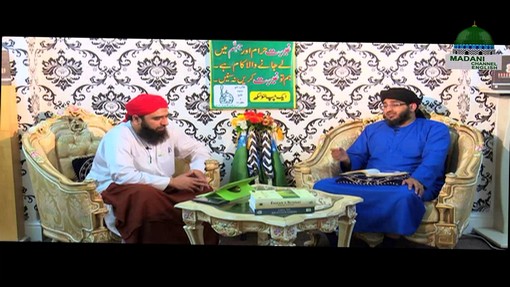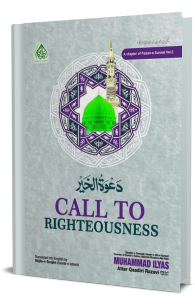
The pious predecessors رَحِمَهُمُ الـلّٰـه adopted many ways to spread ‘call to righteousness’ around the world, three important ways are as follows:
Remarkable literary work, great speeches and impeccable character:
1. Literary work
‘Inviting people to righteousness through literary work is the very old, important and productive method. Sayyiduna Ka’b Ahbaar رَحْمَةُ الـلّٰـهِ عَلَيْه has stated: ‘Firstly Sayyiduna Aadam عَـلَيْـهِ الـسَّـلَام wrote books in Arabic and Syriac languages three hundred years before his demise. He عَـلَيْـهِ الـسَّـلَام first wrote [words] on wet clay, then solidified them with fire.’ (Ruh-ul-Bayan, vol. 10, pp. 473)
Sayyiduna Sulayman عَـلَيْـهِ الـسَّـلَام wrote a letter to the Queen Bilqees for inviting her to Islam. It has also been mentioned in the Holy Quran. (Part 19, Surah Al-Naml, Ayah 28) After the truce of Hudaybiyah, when the war threats were lifted and peace prevailed all around, the Holy Prophet صَلَّى اللّٰـە عَلَيْهِ وَاٰلِهٖ وَسَلَّم sent letters to the king of Rome ‘Qayser’, king of Persia ‘Kisra’, king of Abyssinia ‘Najashi’, king of Egypt ‘Aziz’ and other kings of Arab and rest of the world, inviting them to Islam. (Seerat-e-Mustafa, pp. 364)
Dear Islamic brothers! Blessed Scholars and honourable Mashaaikh have spread the message of Islam through their literary work in every era. Mufassireen[1], Muhaddiseen[2], Fuqaha[3], Mujtahideen[4], etc. have written innumerable books for the guidance of Ummah. Some great scholars have authored so many excellent and voluminous books within very short lifespan, leaving the world amazed. The names of some great scholars are as follows:
1. Imam Abul Wafa Ibn-e-Aqeel رَحْمَةُ الـلّٰـهِ عَلَيْه has authored eighty books on different subjects. And among them, one of his books comprises 800 volumes.
2. Imam Muhammad رَحْمَةُ الـلّٰـهِ عَلَيْه has authored around one thousand books.
3. Imam Ibn-e-Jareer رَحْمَةُ الـلّٰـهِ عَلَيْه has authored three hundred and fifty eight thousand (358,000) pages in his lifetime.
4. Imam Ghazali رَحْمَةُ الـلّٰـهِ عَلَيْه authored 78 reformatory, academic and research based books. Out of them, a great piece of writing, ‘Yaqoot-ut-Taveel’ comprises 40 volumes.
5. Imam Ibn-e-Hajar Makki Shaafi’i رَحْمَةُ الـلّٰـهِ عَلَيْه has authored more than 500 remarkable books.
6. Imam-e-Ahl-e-Sunnat, Imam Ahmad Raza Khan رَحْمَةُ الـلّٰـهِ عَلَيْه has authored more than one thousand (1,000) books.
7. In the current era, Ameer-e-Ahl-e-Sunnat, ‘Allamah, Maulana, Muhammad Ilyas Attar Qaadiri دَامَـتْ بَـرَكَـاتُـهُـمُ الْـعَـالِـيَـهْ has written hundreds of books and booklets despite his extremely busy commitments in connection with the activities of Dawat-e-Islami, his acts of worship and so many other matters, etc.
2. Lectures and speeches
Delivering lectures, speeches and Dars is also one of the important means of inviting people towards the Creator, Allah Almighty. The Blessed Prophets عَـلَـيْهِمُ السَّلَام kept inviting people towards Allah Almighty through motivating by their words and speeches in every era. The Last Prophet صَلَّى اللّٰـە عَلَيْهِ وَاٰلِهٖ وَسَلَّم of Allah Almighty followed the same blessed practice. Having received the commandment of Allah عَزَّوَجَلَّ, the Holy Prophet صَلَّى اللّٰـە عَلَيْهِ وَاٰلِهٖ وَسَلَّم went to mount Safa and invited people to the religion of Allah Almighty through his majestic speech. During 23 years of his lifespan after the declaration of Prophethood, he صَلَّى اللّٰـە عَلَيْهِ وَاٰلِهٖ وَسَلَّم continuously conveyed the message of Allah Almighty to people through his blessed speeches. Even today, the blessed words passed the blessed lips of the Holy Prophet صَلَّى اللّٰـە عَلَيْهِ وَاٰلِهٖ وَسَلَّم are present in the form of Ahadees.
After the Holy Prophet صَلَّى اللّٰـە عَلَيْهِ وَاٰلِهٖ وَسَلَّم, the blessed companions عَـلَيْهِمُ الرِّضْوَانْ spread across the world to call people towards Allah Almighty and conveyed the message of the Creator. Following their footsteps, Tabi’een, Tab’ Tabi’een رَضِىَ الـلّٰـهُ عَـنْهُم, pious predecessors رَضِىَ الـلّٰـهُ عَـنْهُم and the blessed scholars رَحِمَهُمُ الـلّٰـه also kept spreading ‘call to righteousness’ committedly.
اَلْحَمْدُ لِلّٰە! The Madani movement of the devotees of the Holy Prophet, Dawat-e-Islami, is also a chain of this great mission and at present, Dawat-e-Islami has been serving the Deen of Allah far and wide by carrying out its Madani activities in more than 200 countries across the globe. Due to its blessings, hundreds and thousands of non-practicing Muslims have repented, started following the Sunnahs and have become the preachers of Islam. The preachers of Dawat-e-Islami also serve this noble cause by delivering speeches.
Remember! In order to deliver a good speech, a preacher should be mindful of few things.
First of all, a preacher should collect information about the mindset of the people living in that area where Ijtima’ is being taken place, so that he can prepare the speech according to their mind-set and levels. This will help him a lot to address the correct subject and study the punishments and social impacts of the evils prevailed in that area beforehand. Moreover, easy words should be used to deliver the speech.
3. Character
Dear Islamic brothers! It is not possible for everyone to propagate Islam through literary work and speeches. Islamic knowledge is mandatory for calling people towards Allah Almighty. If a non-‘Aalim [the one not an Islamic scholar] tries to write a religious book, he will likely to commit mistakes. In order to convey the ‘call to righteousness’, one also needs to be well aware of the manners of talking in addition to having the knowledge of Islam. If a non-'Aalim wants to deliver a speech, he should read to the attendees a book written by any authentic Islamic scholar. However, there is another way of preaching, easier than literary work and speech; that is one’s own character.
The noble character of the Holy Prophet صَلَّى اللّٰـە عَلَيْهِ وَاٰلِهٖ وَسَلَّم stood him out as the most impeccable one ever, to the point that the disbelievers of Makkah used to call him Sadiq (truthful) and Amin (honest) even before the declaration of the Prophethood. In addition to writing (books and booklets) and speeches, the pious predecessors رَحِمَهُمُ الـلّٰـه also spread the message of Islam through their excellent character.
Sayyiduna Maalik Bin Dinar رَحْمَةُ الـلّٰـهِ عَلَيْه rented a house near a disbeliever’s house and his room was adjoined to the door of the disbeliever. The disbeliever got fitted a drain outside his house for causing trouble to him. Now, through this drain, he would throw filthy water on the house of Sayyiduna Maalik Bin Dinar رَحْمَةُ الـلّٰـهِ عَلَيْه, making his praying area polluted and impure. He continued this bad practice for a very long time but he رَحْمَةُ الـلّٰـهِ عَلَيْه never complained. One day, the disbeliever said to Sayyiduna Maalik Bin Dinar رَحْمَةُ الـلّٰـهِ عَلَيْه himself: ‘Do you have any trouble due to my drain?’ He رَحْمَةُ الـلّٰـهِ عَلَيْه replied: ‘When filth drops through the drain, I clean it every day with my broom.’
Surprised, the disbeliever said: ‘Despite facing so much trouble, you have never got angry?’ He رَحْمَةُ الـلّٰـهِ عَلَيْه replied, Allah Almighty has said: ‘Those who control their anger, not only are their sins forgiven but also they earn reward.’ Listening to this, the disbeliever said: ‘Indeed, your religion is excellent, because showing patience over the troubles caused by enemies considered good [in Islam]. So, today, I embrace Islam wholeheartedly.’(Tazkira-tul-Awliya, pp. 51)
It is requested to all devotees of the Holy Prophet to use their writing skill, communication skill and their good character for calling people to Allah Almighty. For the ease of attaining this purpose, practically join the Madani environment of Dawat-e-Islami.
May Allah Almighty give us Taufeeq of serving Islam with sincerity.
اٰمِیْن بِجَاہِ النَّبِیِّ الْاَمِیْن صلَّی اللہ علیہ واٰلہٖ وسلَّم


















Comments